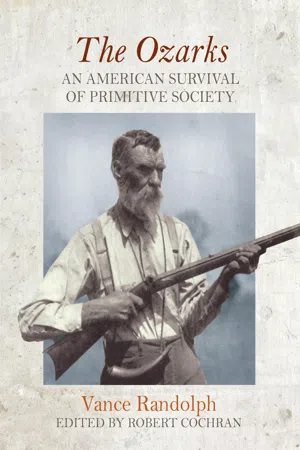![]()
CHAPTER VII.
Ozark Folk-Songs
IN PIONEER DAYS THE OZARK hillmen had religious scruples against dancing and card-playing, and singing was one of their principal forms of social entertainment. Men and women who sang well were always in demand, and enjoyed considerable prominence in the social life of the neighborhood. They had no written music, and most of them could not read anyhow, so they clung to the good old songs which their parents sang before them, and which had been perpetuated for generations by oral transmission.
Recently, however, the Ozark country has been commercialized as a Summer playground, and the younger hill people in particular are now more or less corrupted by contact with the tourists and realtors. Since the coming of schools, newspapers and phonographs the old songs and ballads are rapidly falling into disrepute; the younger generation knows little about them and cares less, while the older people have grown sensitive and sullen under the derision of the schoolmarms and other rural cognoscenti, and are more and more inclined to keep their memories to themselves.
It is still possible, however, for the diplomatic collector to obtain a considerable number of old songs in the more isolated sections of the Ozark highland, and it is a harvest well worth the reaping. Some of the oldest ballads came over from England with the seventeenth-century colonists, others are evidently later importations, still others had their origin in the mountains of Kentucky and Tennessee, and some are derived from comparatively modern songs which have somehow filtered into the hill country, to be gradually molded by the mountain singers into the traditional folk-song pattern. Whatever their origin, the Ozark singers have long ago lost all knowledge of the authorship and provenience of these pieces, and they are all true folk-songs in the modern sense of the term.
The collecting of this material is a delicate and difficult matter at best, and the man who simply rides up to a mountain cabin and asks somebody to sing old songs will never hear any songs worth recording. The successful collector must either be introduced and vouched for by someone whom the natives know and trust, or he must cultivate the hillman for himself, and lead up to the subject of balladry by slow and easy stages. The mountain man usually begins the conversation, and the stranger must always be prepared to give his name, his address, and all the details of his lineage and means of livelihood, after which he is usually permitted to talk on topics of general interest as freely as he likes. Meanwhile the hillfolk sit around and eye him narrowly, usually replying in a courteous but noncommittal fashion. After an hour or so of this, if he has convinced them that he is a serious minded and responsible person, not too “fine-haired” or “stuck-up”, he may at least make known the object of his quest.
I usually begin by telling them frankly that I am getting up an old-fashioned songbook in order that our children may be able to sing the good old ballads, which are infinitely superior to the songs in vogue among the young folk today. Many people, I aver, would be glad to buy a book with the real old-time songs in it, were such a book obtainable. The trouble is, however, that so many of the old ballad-singers have died recently—and here I name several local examples—that it is mighty hard to find anybody who can sing the old songs properly. At this point there is often a vigorous nodding of heads, because every singer knows that he sings the ballads correctly, and that all other versions are degenerate corruptions. “Now”, I say to the most promising member of the group, “folks all tell me that you know more old songs than anybody else in these parts, and I have ridden a long way today to ask you to sing a few of the best ones, so that I can write them down and print them in my book.”
Only in rare instances is there any immediate response to such a plea as this. Usually, after some meditation, the person addressed admits that perhaps he might have sung a little in his youth, but adds that he has long ago forgotten every word of the old songs. Very often he refers me to some other old singer, and volunteers minute directions as to the best route to the other singer’s cabin. I always make a careful note of this information, but do not make any motion to leave; I rather try to lead the talk away from old songs for awhile, in order to let the singer consider the matter a bit, and get accustomed to the idea of singing for me.
After awhile, if nobody returns to the subject nearest my heart, I name over a few of the songs that I am most anxious to obtain. If this fails to get any response I whistle a bar or two, and then say suddenly: “By the way, I got a good one the other day from old man so-and-so,” naming some local character known to my hearers, and then boldly begin to sing the ballad, but contrive to make some grievous error in the third or fourth stanza. This butchering of an old favorite is more than any genuine ballad-singer can endure, and he frequently bursts out with “Hell! Thet aint it!” after which he is very likely to sing the entire song without any further persuasion. It is a peculiar fact that, the ice once broken, the singe...
